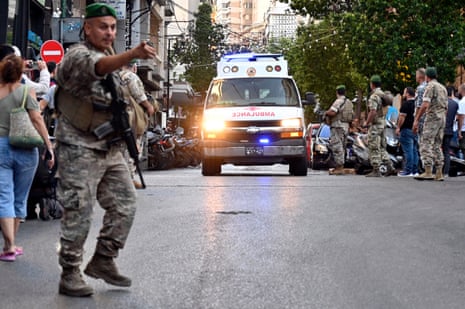The extraordinary 17 September pager attack in Lebanon, followed by today’s walkie-talkie attack, constitute the biggest security breach that Hezbollah has encountered in its history. The attacks – widely attributed to Israel’s Mossad agency though not yet officially claimed by Israel – present a serious dilemma for Hezbollah. They add to the pressure on the group to retaliate against Israel but at the same time severely limit its military options. The attacks also deal a blow to Hezbollah’s morale and credibility as an armed group purporting to possess high security standards.
Hezbollah can no longer claim to be impenetrable when it comes to its security. For decades, the group presented observing secrecy in its operations and communications network as necessary for its role in supporting Lebanon’s defence. This is why it insisted on having a telecommunications network that is completely separate from the national grid. It is also why Hezbollah defended its clandestine activities in Beirut’s port and airport. It has been importing and exporting goods through those public facilities as well as across Lebanon’s border with Syria without any supervision or intervention by Lebanon’s state authorities.
To minimise the likelihood of exposure, Hezbollah often had oversight over the whole process of acquiring or selling goods in Lebanon, including weapons and drugs. It also dealt swiftly with the discovery of any infiltrators within its ranks. The group exercises high surveillance in its areas of influence in southern Lebanon, the Beqaa valley and Beirut. Such measures conveyed the image of a group running a security state within the Lebanese state.
The pager and walkie-talkie attacks have shattered this image. They have shown that Hezbollah is vulnerable to Israeli interception of not just its communications network but also its supply chain. With such a high level of exposure, the group will be carefully calculating its next steps against Israel. There will also be widespread paranoia within the group regarding what else Israel may have been able to sabotage. This in turn lowers morale among Hezbollah’s ranks.
The level of disarray caused by the pager attack comes on top of existing concern within Hezbollah regarding Israeli surveillance. Since last October, Israel has been persistently targeting hundreds of its officers and commanders across southern and eastern Lebanon, and even in Beirut. Those personnel have been killed by Israeli strikes not just on the battlefield but also in houses and cars. After Hezbollah identified that Israel was able to track its movements through mobile phones, it instructed its operatives to shift to pagers instead on the basis that the less sophisticated technology meant safer communication.
Hezbollah has repeatedly vowed to exact revenge on Israel for its attacks on the group, but even Israel’s assassination of a top commander, Fuad Shukr, did not spark any serious retaliation. This is partly because it is not in Hezbollah’s interests to engage in action that could lead to full-on war with Israel, and partly because security vulnerability limits its ability to plan military activities. The pager attack has underlined that the level of this vulnerability is far greater than Hezbollah anticipated. It has virtually paralysed its military arsenal. After all, any military plan would necessitate the use of communication tools, and Hezbollah’s have been shown to be compromised.
Israel has the option of using Hezbollah’s heightened weakness to conduct a large-scale military operation against the group in southern Lebanon. But Israel will not necessarily go down that route, because it would not be beneficial. Hezbollah is used to fighting against Israel militarily and can withstand a great deal of loss in that regard: it can later rebuild its arsenal, as it did after its last war with Israel in 2006. These attacks, however, act as a deterrent in lieu of military action.
Their success will benefit the Israeli prime minister, Benjamin Netanyahu, politically. Netanyahu has been under a lot of public pressure to secure Israel’s northern border with Lebanon. He can claim these attacks as a spectacular concrete step towards achieving that goal. Meanwhile, Israel is carrying on with its military attacks on southern Lebanon at the same pace as before 17 September, which indicates that this week’s attacks are a standout incident and not part of a wider shift in strategy.
The attacks also undermine Hezbollah’s exceptional status in Lebanon as the country’s only armed entity other than the Lebanese Armed Forces. Hezbollah has been using this status to bolster its political standing in the country. The operational paralysis brought about by Israel opens the door to eventual political loss.
All those challenges put Hezbollah under unprecedented pressure, as it will want to salvage its political standing in Lebanon and retain credibility in its fight with Israel. While the next moves in the conflict are uncertain, Israel has already deeply humiliated Hezbollah, which shrinks the group’s space for manoeuvre. But as long as there is no ceasefire deal to end the Gaza conflict, the possibility of both Israel and Hezbollah eventually expanding the scope of their battles remains on the table.
-
Lina Khatib is director of the Soas Middle East Institute and associate fellow at the Middle East and North Africa programme at Chatham House

